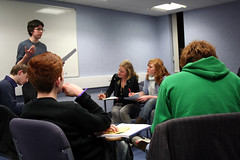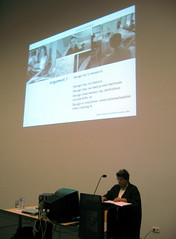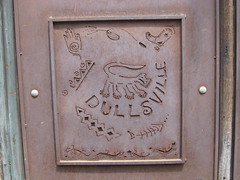By now you should have a sensible
structure for your essay and an
opening paragraph that grabs the attention. The task now is to marshal the facts at your disposal in making a really persuasive argument.
An argument is not something you have with your housemate after too much red wine. It's the structured, reasoned establishment of a point of view on the basis of evidence. (Have a look back at
this post if you need a refresher on this.) With an academic argument, you are trying to persuade somebody of something, by showing them how logic and evidence support that point of view. Facts are the foundation stones of an argument—you can build one without them (based on your own intuitions, hunches or prejudices) but it will quickly fall down.
So what sort of evidence is going to be important? The first point is that it needs to be
good evidence. Asking your friends for their opinions is not going to cut the mustard. What we need here are published scientific findings from reputable sources. That means
academic journals and books, although other sources of information (such as the internet) can, if carefully evaluated, also be relevant.
You then need to evaluate that evidence. Is it really relevant to your argument? Was the study well designed and conducted? Get into the habit of looking carefully at the Methods sections of the articles that you read, checking for flaws in the design, or methodological problems that might affect how the data should be interpreted. Not all published data is good data. Don't be afraid to be critical about any aspect of a study, if criticism is warranted. Is the rationale sound? Are the methods appropriate? Have the data been properly analysed? Are the findings actually relevant to the study's hypotheses? Are the interpretations of the data sensible? Are the conclusions valid and appropriate?
If you're happy that you have good findings to rely on, then you can be more confident in arguing your case. Here are some tips for constructing a convincing argument.
1. Support every claim or assertion with a piece of evidence.
Ask yourself: what is the basis of this claim? On what evidence is it founded? If I want to make the point that children acquire language quickly, how do I back this claim up with scientific findings? Make sure that you make proper reference to published studies (we'll be looking in more detail on referencing in a week or so). You might want to cite a 'classic' study in the field, or something more recent. It might be appropriate, for example, to cite a recent
review article which summarises lots of different studies in the field. But make sure that everything you say is backed up by scholarly research.
2. Evaluate the strength of the evidence.
In psychology, as in many other disciplines, there are few debates that can be settled by any one decisive bit of data. Some findings are stronger, more reliable, more generalisable than others. When using evidence to back up a claim, be critical in evaluating it, and show that you understand its weaknesses and strengths.
3. Consider evidence to the contrary.
Science is as much about proving things wrong as it is about proving things right. Don't keep quiet about evidence which fails to support your thesis. Show that you are aware of it, and give it as much attention as you do to the supportive stuff.
4. Think about alternative points of view.
There is always another side to every argument. Think about alternative viewpoints on the data you are discussing. If you haven't read about any such alternative interpretations, then come up with your own! Strive to make your argument a balanced one.
5. Don't let the facts lead.
The facts are critical, but they should not drive the essay. The driving force behind your assignment should be your ideas, your argument, your plans for this piece of connected prose. Student assignments often read like an unconnected list of empirical findings, in which it is hard to discern any argument or ideas. Don't let your essay be like that.
6. Reference, reference, reference.
If in doubt, cite. You don't need to reference an academic study when writing your own name at the top of the page, but you do for just about everything else. Be particularly wary of the following scenarios where proper referencing is absolutely essential: direct quotations from someone else (although see below); the use of tables, graphs or diagrams from other work; assertions about the statements or opinions of any named individual; descriptions of how a particular piece of research was conducted; and assertions of fact of any kind, unless they are so obviously part of general knowledge that they don't require a reference.
7. Watch the flow.
The logic of your argument might be perfect, but you need to make sure that your reader is on board. Connect your paragraphs and sections of argument with succinct linking sentences which make the flow clear to the reader ('Having considered x, we can now consider y...').
8. Learn to hate quotations.
Direct quotations are only rarely appropriate in an essay assignment. If the person you are quoting has put the thought in a particularly elegant, succinct or epoch-defining way, then quote them sparingly, with full attribution. By this I mean quotation marks showing where the quotation begins and ends (you don't want to be accused of
plagiarism), full referencing of the quoted source, and page numbers showing where in the source the quotation comes from. Generally, you should steer clear of direct quotations and put your ideas in your own way. There is nothing less impressive than an assignment that is full of other people's words.
9. Draw a sensible conclusion.
Go as far as your evidence reasonably allows you to go. Speculate on how things might be, or how future research might change the picture, but be clear when you are speculating and when you are arguing on the basis of findings. We'll be looking some more at conclusions next time.
Please leave a comment on this post or any other. Let me know if you're finding this useful, or if there's anything else you'd like to see covered.
 Image by Lizzie Wells via Flickr
Image by Lizzie Wells via Flickr![Reblog this post [with Zemanta]](http://img.zemanta.com/reblog_e.png?x-id=76321e51-61c7-4f28-99a1-51cbbfd29681)

![Reblog this post [with Zemanta]](http://img.zemanta.com/reblog_e.png?x-id=3f9c6e60-1241-4480-b4dc-cf3dd5828e07)

![Reblog this post [with Zemanta]](http://img.zemanta.com/reblog_e.png?x-id=b3f0b486-61aa-4bc3-8ca2-87f599c3ae62)

![Reblog this post [with Zemanta]](http://img.zemanta.com/reblog_e.png?x-id=6138d55c-03d8-4ff9-93b5-039a3cfb0c62)

![Reblog this post [with Zemanta]](http://img.zemanta.com/reblog_e.png?x-id=4755fc36-ab12-436d-848c-a00d41dc44c4)
![Reblog this post [with Zemanta]](http://img.zemanta.com/reblog_e.png?x-id=35743d9e-5afa-40d6-ad54-41a096af7082)


